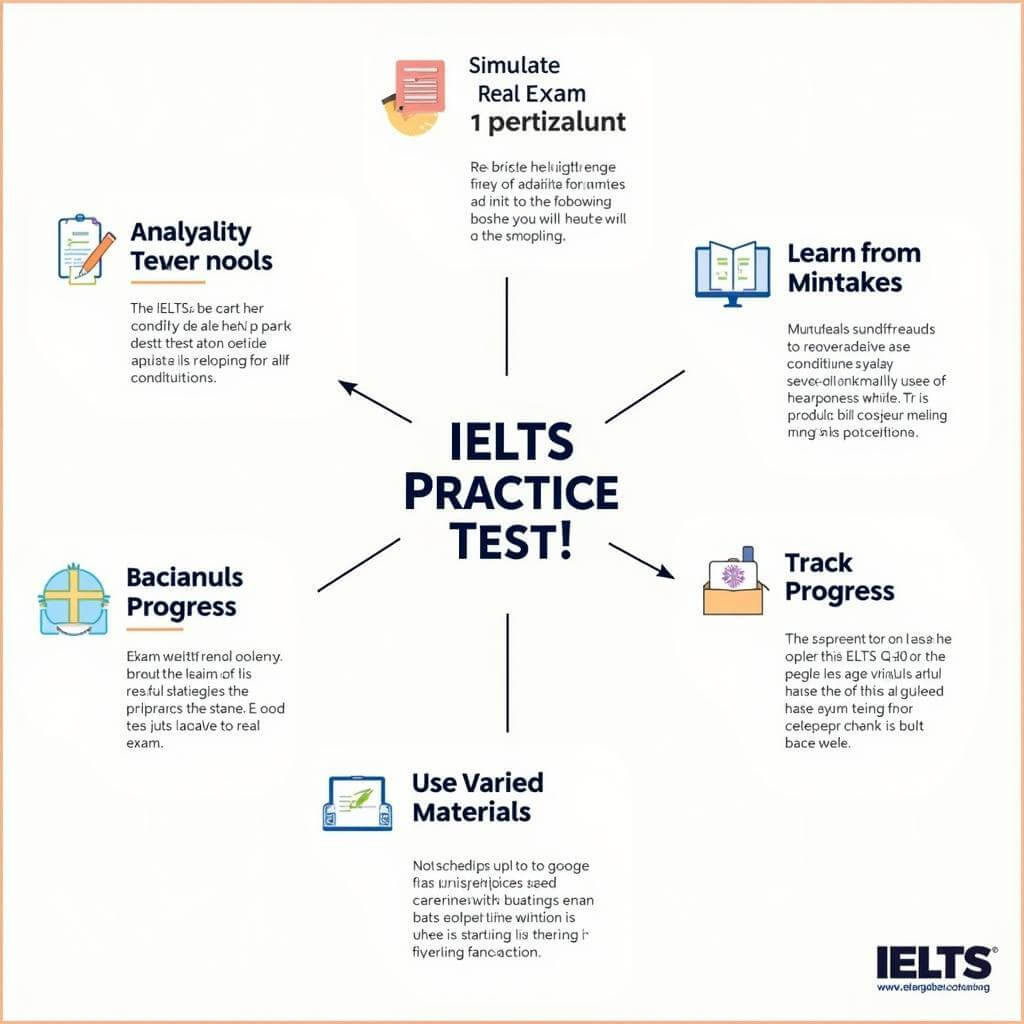As an experienced IELTS instructor, I can confidently say that utilizing practice tests effectively is one of the most crucial aspects of IELTS preparation. Many students underestimate the power of practice tests, often treating them as mere formalities. However, when used correctly, these tests can significantly boost your performance and confidence on exam day. Let’s dive into the art of using practice tests effectively to maximize your IELTS score.
Understanding the Importance of Practice Tests
Practice tests serve as a mirror, reflecting your current abilities and highlighting areas that need improvement. They familiarize you with the exam format, time constraints, and question types, effectively reducing test-day anxiety. Moreover, they help you develop essential test-taking strategies and time management skills.
How to practice IELTS listening with academic lectures is a crucial aspect of your preparation, especially for the Listening section. By incorporating academic lectures into your practice routine, you can significantly enhance your ability to understand complex ideas and specialized vocabulary.
Strategies for Effective Use of Practice Tests
1. Simulate Real Exam Conditions
To get the most out of your practice tests, recreate the actual exam environment as closely as possible. Find a quiet space, adhere to time limits, and avoid interruptions. This approach helps you build stamina and acclimates you to the pressure of the real test.
2. Analyze Your Performance
After completing a practice test, don’t just focus on your score. Conduct a thorough analysis of your performance:
- Identify patterns in your mistakes
- Note questions that took too much time
- Recognize areas where you felt less confident
This analysis will guide your future study plans and help you target specific weaknesses.
3. Learn from Your Mistakes
Mistakes are valuable learning opportunities. For each incorrect answer:
- Understand why your answer was wrong
- Learn the correct approach to similar questions
- Review relevant grammar rules or vocabulary
By doing this, you transform each error into a stepping stone for improvement.
Focusing on speaker emphasis is a crucial skill, particularly for the Listening section. Pay attention to how speakers stress certain words or phrases, as this often indicates important information.
4. Track Your Progress
Keep a record of your practice test scores and the types of questions you struggle with. This tracking allows you to:
- Visualize your improvement over time
- Identify persistent problem areas
- Adjust your study plan accordingly
5. Use a Variety of Practice Materials
Don’t limit yourself to a single source of practice tests. Utilize:
- Official IELTS practice materials
- Reputable third-party resources
- Past exam papers
This variety ensures you’re prepared for any question style or topic that may appear in the actual test.

Applying Practice Test Insights to Each IELTS Section
Listening
- Practice with different accents and speech speeds
- Focus on note-taking techniques
- Pay attention to signposting words and phrases
Recognizing speaker bias effectively is an advanced skill that can give you an edge in the Listening section. Being able to detect subtle hints of bias in a speaker’s tone or word choice can help you better understand the context and implications of the information presented.
Reading
- Improve your skimming and scanning skills
- Practice time management strictly
- Familiarize yourself with various question types (e.g., multiple choice, matching, True/False/Not Given)
Writing
- Time yourself for each task
- Practice brainstorming and planning within the time limit
- Familiarize yourself with common topic areas
Speaking
- Record your responses and analyze them
- Practice with a variety of topics
- Work on fluency and coherence
Focusing on key speaker phrases can significantly improve your performance in both the Listening and Speaking sections. By identifying and understanding these phrases, you can better follow the speaker’s arguments and structure your own responses more effectively.
Common Mistakes to Avoid When Using Practice Tests
-
Overreliance on scores: Don’t fixate solely on your practice test scores. Focus on learning and improvement.
-
Neglecting time management: Always stick to the time limits to build proper pacing skills.
-
Ignoring instructions: Read and follow instructions carefully, just as you would in the real exam.
-
Not reviewing answers: Always review both correct and incorrect answers to reinforce learning.
-
Rushing through practice: Take each practice test seriously to get the most benefit.
Effective Practice Techniques
-
Spaced repetition: Spread your practice tests over time rather than cramming them all at once.
-
Active recall: After each practice test, try to recall key points and strategies without looking at your notes.
-
Interleaved practice: Mix different question types and sections in your practice sessions.
-
Deliberate practice: Focus intensively on your weak areas.
-
Peer review: Discuss your answers with study partners or tutors for additional insights.
Focusing on tone changes is a subtle but important skill, especially for the Listening section. Changes in a speaker’s tone can signal shifts in topic, emphasis, or emotional state, all of which can be crucial for understanding the full context of the information presented.
Conclusion
Effectively using practice tests is a powerful strategy for IELTS success. By simulating real exam conditions, analyzing your performance, learning from mistakes, and applying insights to each section, you can significantly enhance your IELTS preparation. Remember, the goal is not just to take practice tests, but to learn and improve from each one. Stay consistent, stay focused, and you’ll see your IELTS performance soar.
We encourage you to share your experiences with practice tests in the comments below. What strategies have worked best for you? How have practice tests improved your IELTS preparation? Your insights could be invaluable to fellow test-takers on their IELTS journey.